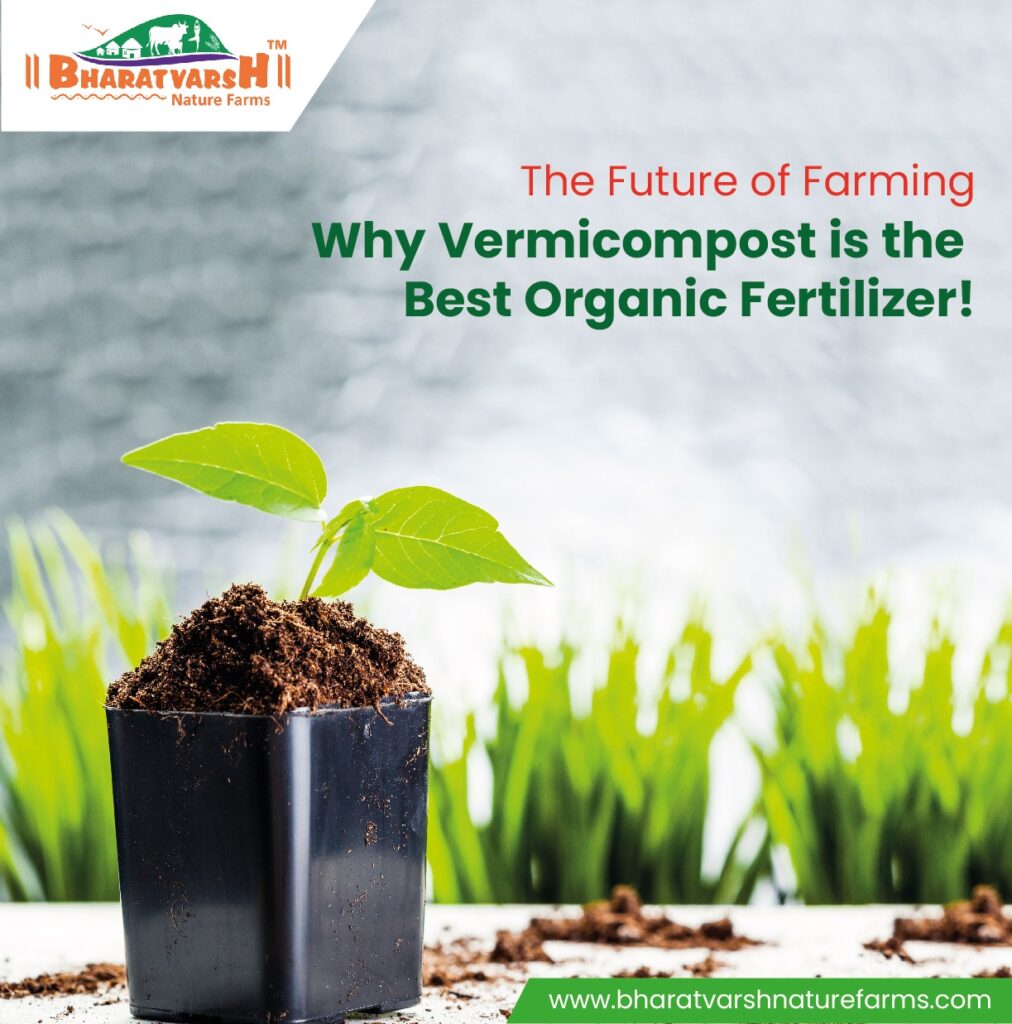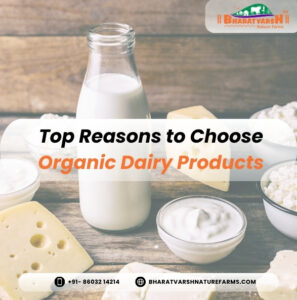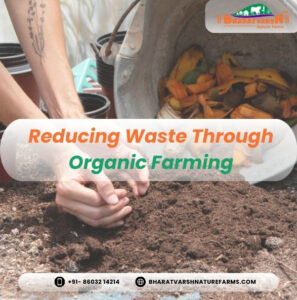Farming has evolved significantly over the years, but one thing remains constant-healthy soil is the key to high-yield crops. As the world moves towards sustainable agriculture, farmers and gardeners alike are searching for alternatives to chemical fertilizers. The solution? Vermicompost-the best organic fertilizer!
At Bharatvarsh Nature Farms, we believe that organic fertilizer for farming is not just a trend but a necessity for long-term soil health. Vermicomposting, or composting with earthworms, is an eco-friendly and nutrient-rich compost for plants, offering numerous benefits over synthetic fertilizers.
In this guide, we will explore the benefits of vermicompost, the vermicomposting process, and why it is the best organic manure for crops. Whether you’re a commercial farmer or a home gardener, you’ll learn why earthworm composting benefits both soil and plants, making it the perfect choice for chemical-free farming methods.
Why Vermicompost is the Best Organic Fertilizer?
Chemical fertilizers may give quick results, but they harm soil health in the long run. On the other hand, vermicompost offers sustainable soil enrichment while improving plant growth naturally.
Here’s why vermicompost is the best organic fertilizer:
- Rich in Essential Nutrients – Contains nitrogen, phosphorus, potassium (NPK), and beneficial microbes.
- Improves Soil Health – Enhances soil texture, aeration, and water retention.
- Eco-Friendly Farming Solution – 100% natural and reduces reliance on chemicals.
- Boosts Plant Growth – Provides a slow-release form of nutrients for steady growth.
- Encourages Chemical-Free Farming – Promotes organic agriculture while maintaining high yields.
By using the best organic fertilizer, farmers can ensure long-term sustainability and increased crop productivity without harming the environment.
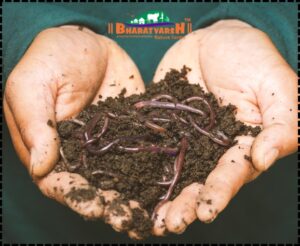
The Vermicomposting Process: How Earthworms Create the Best Organic Fertilizer
The process of vermicomposting is simple, cost-effective, and highly efficient. It involves using earthworms to break down organic matter into nutrient-rich compost for plants.
Step-by-Step Vermicomposting Process
1️⃣ Prepare the Composting Bin
- Choose a well-ventilated bin and add moist bedding materials like shredded paper, coconut coir, or dry leaves.
2️⃣ Introduce the Earthworms
- Red wigglers (Eisenia fetida) are the best worms for vermicomposting as they consume organic waste rapidly.
3️⃣ Feed the Worms
- Add organic waste such as vegetable scraps, fruit peels, coffee grounds, and dry leaves.
- Avoid meat, dairy, and oily food waste, as they can attract pests.
4️⃣ Maintain Proper Moisture and Aeration
- Keep the compost moist but not too wet.
- Stir occasionally to maintain airflow and avoid foul odors.
5️⃣ Harvest the Vermicompost
- Within 3-4 months, the worms will convert the waste into dark, crumbly, nutrient-rich compost.
- Separate the worms and use the compost as the best organic manure for crops.
Benefits of Vermicompost: Why It’s a Game-Changer in Organic Farming
1. Nutrient-Rich Compost for Plants 🌱
One of the biggest benefits of vermicompost is its high nutrient content. It contains:
✔ Nitrogen – Essential for leafy plant growth.
✔ Phosphorus – Promotes strong root development.
✔ Potassium – Enhances flower and fruit production.
✔ Beneficial Microbes – Helps decompose organic matter and improve soil fertility.
This nutrient-rich compost for plants ensures that crops receive balanced nutrition, leading to higher yields and better quality produce.
2. Sustainable Soil Enrichment for Long-Term Productivity 🌍
Unlike chemical fertilizers that degrade soil over time, vermicompost promotes sustainable soil enrichment by:
✔ Enhancing soil structure and aeration.
✔ Improving moisture retention, reducing water usage.
✔ Encouraging beneficial microorganisms that boost plant immunity.
This makes it the ideal organic fertilizer for farming that ensures long-term soil fertility.
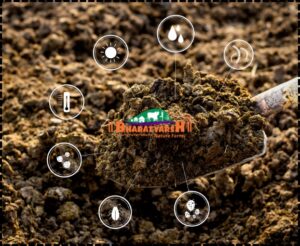
3. Eco-Friendly Farming Solutions for a Greener Future 🌱
Farmers are shifting towards eco-friendly farming solutions to combat soil degradation and environmental pollution. Vermicomposting helps by:
✔ Reducing greenhouse gas emissions caused by synthetic fertilizers.
✔ Recycling organic waste and converting it into valuable manure.
✔ Encouraging biodiversity, supporting worms, fungi, and beneficial bacteria.
By adopting vermicomposting, farmers contribute to a more sustainable and chemical-free farming future.
4. Chemical-Free Farming Methods for Healthier Crops 🚜
Consumers are increasingly demanding chemical-free food due to concerns about pesticide residues. Using vermicompost allows farmers to:
✔ Grow crops without synthetic fertilizers or harmful pesticides.
✔ Improve plant disease resistance naturally.
✔ Enhance food safety and nutritional value.
By switching to the best organic fertilizer, farmers can meet market demands while protecting their soil.
5. Best Organic Manure for Crops: Improves Growth & Yield 🌾
Among all organic fertilizers, vermicompost is considered the best organic manure for crops because:
✔ It releases nutrients slowly, preventing over-fertilization.
✔ Boosts plant immunity, reducing the need for chemical pesticides.
✔ Increases water retention, helping plants survive drought conditions.
With Bharatvarsh Nature Farms, farmers can access high-quality vermicompost, ensuring better crop production and sustainable farming.
How to Use Vermicompost for Maximum Benefits?
To maximize the benefits of vermicompost, follow these usage guidelines:
🌱 For Potted Plants: Mix 1 part vermicompost with 2 parts soil for healthy plant growth.
🌱 For Vegetable Gardens: Apply 2-3 kg per square meter before planting.
🌱 For Fruit Trees: Add 4-5 kg of vermicompost around the base of each tree.
🌱 For Lawns: Spread a thin layer over grass every 2-3 months for a lush, green lawn.
By applying the best organic fertilizer correctly, you can enjoy higher yields, healthier plants, and sustainable soil.
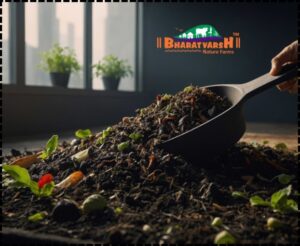
FAQs About Vermicompost & Organic Farming
1. What makes vermicompost the best organic fertilizer?
Vermicompost is rich in nutrients, improves soil health, promotes plant growth, and is environmentally friendly.
2. How long does vermicomposting take?
It typically takes 3-4 months for worms to break down organic waste into nutrient-rich compost for plants.
3. Can vermicompost be used for all types of crops?
Yes! It is suitable for vegetables, fruits, flowers, cereals, and even indoor plants.
4. Is vermicompost better than chemical fertilizers?
Absolutely! Unlike chemical fertilizers that degrade soil, vermicompost enhances soil fertility and promotes sustainable agriculture.
5. Where can I buy high-quality vermicompost?
You can get premium-quality vermicompost from Bharatvarsh Nature Farms, ensuring the best organic manure for crops.
Final Thoughts: The Future of Farming is Organic!
With growing concerns over soil degradation and food safety, the shift towards organic fertilizer for farming is more crucial than ever. Vermicompost offers a sustainable, eco-friendly solution, ensuring better crop yields, healthier soil, and a greener planet.
At Bharatvarsh Nature Farms, we encourage farmers and gardeners to embrace the best organic fertilizer for sustainable soil enrichment and chemical-free farming.
🌱 Make the switch to vermicompost today and invest in a healthier future! 🌱
Also Read: Why Organic Food is the Best Investment for Your Health! – Bharatvarsh Nature Farms

